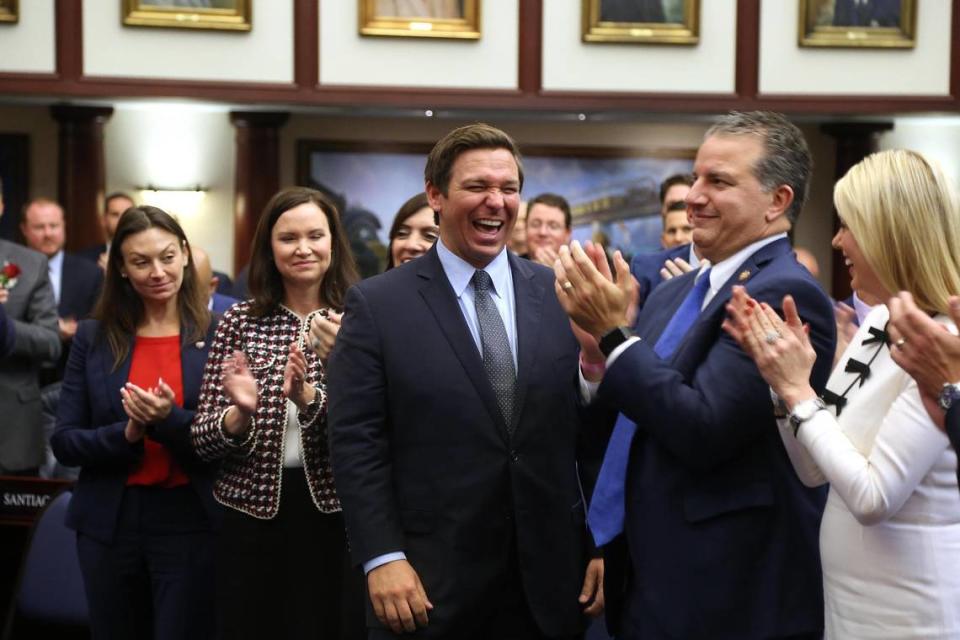Is Bloomberg breaking Florida law if he helps felons pay fines, fees? Inquiry ordered.
Attorney General Ashley Moody on Wednesday asked state and federal law enforcement to investigate “potential violations of election laws” over billionaire Michael Bloomberg’s decision to help pay Florida felons fines, fees and restitution to be eligible to vote.
In a letter dated Wednesday, Moody wrote that she instructed statewide prosecutor Nick Cox to work with law enforcement and any statewide grand jury that Florida Gov. Ron DeSantis may want to call to address the matter.
DeSantis initially asked Moody to review the matter, the attorney general wrote.
The request to launch a criminal investigation escalates Florida’s two-year battle over felon voting rights and could set up a pre-election fight in Florida, a key swing state in the upcoming presidential election.
“Today, I sent a letter to the Florida Department of Law Enforcement and the Federal Bureau of Investigation into potential violations of election laws,” said Lauren Cassedy, a spokeswoman for Moody’s office.
Florida voters in 2018 overwhelmingly approved Amendment 4, a constitutional amendment that reversed a decades-old policy that kept former felons from being able to vote in the state without first seeking official clemency.
Following the 2018 passage of Amendment 4, which restored the right to vote to nearly all of the state’s 1.4 million felons, DeSantis and the Republican-led Legislature passed a law requiring felons to pay back all court-ordered fees, fines or restitution to victims before they could register to vote.
The law, which has been the subject of myriad court battles, dramatically undercut the number of felons who would be eligible to vote. An estimated 80% of felons in Florida are too poor to pay their fees and fines, meaning they would be unable to vote. Most owe between $500 and $5,000.
In response, an organization, the Florida Rights Restoration Coalition, started collecting money to help people with felony convictions pay off court fees and fines — but not restitution.
It is legal in Florida to have someone pay off your court fees, fines or restitution, according to Tampa attorney Michael Steinberg, who represents one of the plaintiffs in the ongoing Amendment 4 litigation.
“It’s no different than if someone gave someone a gift to pay their fines,” he said. “There’s absolutely nothing wrong with it.”
The group’s effort has been underway for more than a year, and the coalition has collected nearly $6 million from celebrities and high-profile figures such as NBA star LeBron James. In Hillsborough County alone, the Rights Restoration Coalition has paid off more than $516,000 in court fees and fines for more than 400 people, according to county clerk data.
Bloomberg says he’ll spend $100 million to help Biden beat Trump in Florida
Bloomberg, a former Democratic presidential candidate, announced this week that he helped the group raise an additional $16 million to help felons who have completed their prison sentences pay fines, fees and restitution so they can vote. The former New York mayor has also pledged $100 million to help Joe Biden win Florida.
But on Wednesday, Republicans, including Chief Financial Officer Jimmy Patronis, called for the investigation into Bloomberg’s plans.

In an early morning interview on the Fox Business network, U.S. Rep. Matt Gaetz, R-Fort Walton Beach, a vocal ally of Trump’s, hinted Bloomberg’s fundraising efforts could be subject to a criminal investigation.
“This isn’t an exercise in democracy, this is cherry picking votes, offering something of value for them,” Gaetz said, noting he spoke with Moody Tuesday night. “I believe the Florida attorney general has jurisdiction.”
Gaetz said Bloomberg may have violated a portion of Florida election law which reads: “No person shall directly or indirectly give or promise anything of value to another intending thereby to buy that person’s or another’s vote.”
Bloomberg focuses on Florida Hispanics with new $8 million Spanish ad blitz
The Florida Rights Restoration Coalition is a nonpartisan group, and the group’s executive director said this week that they are not targeting people registered to a particular political party.
However, Black Floridians, who tend to vote for Democrats, are disproportionately affected by the law advocated by DeSantis last year. Before the passage of Amendment 4, about one in five Black Floridians could not vote because they had a felony conviction. A study by a University of Florida professor shows Black felons are also more likely than white felons to have outstanding fines and fees.
And the Washington Post reported Tuesday that Bloomberg is investing in the ex-felon population in an effort to boost Democrats — an article cited by Moody in her letter.
But offering to pay fines for a group that’s more likely to vote a certain way is not the same as buying a vote, said Steinberg.
“Giving them the money, or paying their fines off, does not even guarantee that they will register to vote, and if they do register to vote, it doesn’t even guarantee who they are going to vote for,” Steinberg said, calling the push to investigate Bloomberg’s effort “nonsense.”

